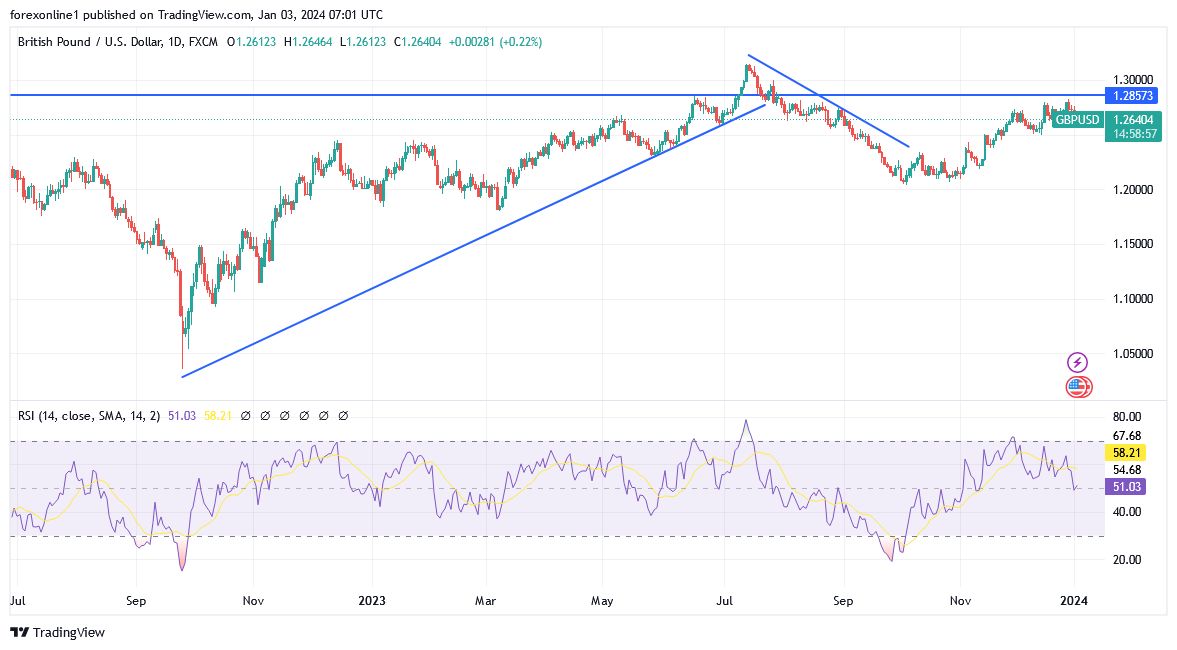Yesterday, the pound sterling fell sharply against the US dollar (GBP/USD), dropping to the support level of 1.2610 before stabilizing around 1.2645 at the time of writing. The sell-off came as the US dollar was supported by risk-averse market sentiment. In general, US dollar (USD) exchange rates are rising in cautious trading. Recently, US dollar rose against all other major currencies as demand for the safe-haven currency was boosted by a mood of concern that has prevailed in financial markets. Market sentiment had deteriorated amid geopolitical uncertainty and a sense of caution ahead of the release of some high-impact US data later this week.

The prevailing risk aversion allowed the US dollar to overcome the weaker than expected US manufacturing PMI. Chris Williamson, chief business economist at S&P Global Market Intelligence, commented: “US manufacturers finished the year poorly, according to the S&P Global PMI survey.” Obviously, production fell at the fastest rate in six months as the recent decline in the order book intensified. Therefore, manufacturing is likely to be a drag on the economy in the fourth quarter.
He added, “Given current order book trends, the overall picture from the survey is one of supply exceeding demand for many commodities, indicating downside risks to production, employment and prices as we approach 2024.”
At the same time, Sterling exchange rates face headwinds as the factory sector weakens. The latest UK PMI results showed a contraction in manufacturing sector growth. The final report for December came in at a reading of 46.2, lower than the expected reading of 46.4, and down from November's seven-month high of 47.2. Commenting on the results, Rob Dobson, Director of S&P Global Market Intelligence, said: “UK manufacturing production contracted at an increasing rate at the end of 2023. Also, the demand backdrop remains tepid, with new orders falling further as difficult conditions persist in both the local market in the United States, and major export markets, particularly the European Union. Thus, the downturn has hurt manufacturers' confidence, which has fallen to its lowest level in a year and encouraged renewed caution on costs with further cuts in inventory levels, purchasing and hiring.
Meanwhile, these numbers had a bad impact on the price of the pound because they would reinforce expectations that the UK economy would contract in the fourth quarter. Therefore, that would push the UK into recession, and put more pressure on the Bank of England to cut interest rates sooner rather than later. Also, a tense market mood was a headwind for an increasingly risk-sensitive pound.
Top Forex Brokers
GBPUSD Expectations and Analysis Today:
In the future, upcoming U.S. data may support the recovery of the U.S. dollar later in the week. The Federal Reserve is set to release the minutes of its December policy meeting on Wednesday. Moreover, with market expectations that the Federal Reserve might start cutting U.S. interest rates early in March of this year, any pessimistic comments from policymakers could pull the U.S. dollar lower. Following that, on Friday, the latest Non-Farm Payrolls report for the United States will be published. Also, December data is expected to show a decline in job growth, impacting the dollar as it is likely to reinforce expectations of interest rate cuts by the Federal Reserve.
Meanwhile, the pound will see limited data release in the first week of 2024. This may leave the pound trading on the market mood alone. If risk appetite improves, this could boost sterling's move forward. Therefore, the continuation of the current selling may push the GBP/USD towards the support levels of 1.2590 and 1.2480, respectively. On the other hand, over the same time period in the daily chart, the bulls may need to return to the resistance area 1.2770 to confirm the strength of control again.
Ready to trade our free trading signals? We’ve made a list of the best UK forex brokers worth using.
